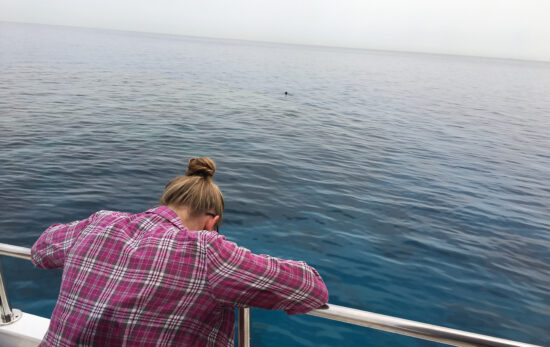The English language is said to be one of the hardest to learn. Indeed, its tricky grammar rules often lead to confusion, mistakes and the emergence of the Grammar Police. In the diving community, one of the biggest debates is whether dived or dove is the correct past tense.
So, let’s settle things once and for all: both versions are correct. The one you choose is essentially down to geography and dialect.

When to Use Dived or Dove
Both of these words are past tense conjugations of the verb to dive. That just means they are a modified version of the word dive that tells people the activity happened in the past.
Dove is much more common in American English; a 2008 survey by American Heritage Dictionary found that 92% of people accepted dove, compared to 72% for dived. You’ll find dove in many American English works, from literary classics like Moby Dick and The Adventures of Huckleberry Finn to modern news sources such as USA Today.
On the other hand, British English strongly favours dived, a fact backed up by Google’s Ngram Viewer and linguistics research which found dove is only used 1% of the time. Countless acclaimed British writers use dived, from J. K. Rowling and Charles Dickens to BBC journalists. Elsewhere, an unscientific experiment found 90% of UK tweets used dived, not dove.
However, this American vs. British English division is only a rule of thumb. Dictionaries on both sides of the pond accept both dived or dove, and some US writing style guides prefer dived as the traditional form. In summary, both are grammatically correct. But to avoid strange looks, it can be helpful to adapt your choice of dived vs. dove to where you’ll be using it.
If you’re using dove, take note:
- Get the pronunciation right. It should rhyme with cove/stove/drove (not love/glove, which would mean you’re talking about a bird or a beauty brand).
- Don’t use it to conjugate other ‘dive’ words. It’s sky-dived not sky-dove, and nosedived not nosedove!

Which Came First: Dived or Dove?
The verb dive originated in the 13th Century from the Old English dufan (to dive, duck, sink) and dyfan (dip, submerge). As a weak verb, the correct past tense should be dived, and that was indeed the case until 1855 when (according to the Oxford English Dictionary) dove first appeared, in American poet Henry Wadsworth Longfellow’s Song of Hiawatha.
Dialectologist Harold Allen suggested that dove first gained popularity in the northern USA where it featured in national textbooks. It later migrated to southern regions after schoolchildren picked up the language from said textbooks. The rest, as they say, is history!
Why Did Dove Become Popular?
Over time, as the English language evolves and is simplified, irregular verbs typically change into regular ones. For example, helped used to be holp, and stepped used to be stop. So, given that changing dived (regular) into dove (irregular) is somewhat against the norm, why did it happen?
Firstly, increased use of similar drive/drove is widely suggested to have influenced the change. This makes sense given the rise in the popularity of cars in America around the same time. Secondly, people like order, logic and patterns (especially when it comes to grammar). So, matching dive/dove with the rhyming drive/drove likely made it more intuitive to learn and remember — and so it stuck.

Dived Still Has a Place in Either Case
While the connection between dive and drive feels logical, there’s a slight hiccup when it comes to the past participle:
| Base verb | Simple past tense | Past participle |
| Drive | Drove | Have driven |
| Dive | Dove (or dived) | Have… diven?! |
So, remember this: whether you prefer I dove or I dived, always use dived with present perfect or past perfect tenses (I have dived or I had dived).

Octopuses, Fishes and Schools – More Diving Grammar
While we’re here, let’s take a moment to clear up some other common misunderstandings.
One Octopus, Two Octo…?
Another controversial topic is the correct pluralisation of octopus, with three variations often used:
- Octopi: based on the Latin convention of adding ‘i’ at the end (as in cacti or stimuli). That’s great, except octopus doesn’t actually come from Latin, making this etymologically incorrect.
- Octopodes: octopus originates from Greek — octo (eight) and pous (foot) — so you can be forgiven for using the greek pluralisation (-odes). In reality, it is rarely used.
- Octopuses: when a noun enters the English language, it’s usually pluralised in its English form (by adding -es) rather than by its Latin or Greek roots. That makes octopuses the correct plural, and the one most commonly used in scientific and academic writing, news, and literature.

Fish or Fishes?
- Fish = one fish, or more than one fish of the same species.
- Fishes = more than one fish of different species.

Shoal or School?
- Shoal = a group of fish swimming loosely together, either the same or different species.
- School = a group of the same species of fish swimming with synchronised movements.
So, there you have it. Next time you feel like cringing at the sound of dived or dove, octopuses or fishes, just remember it’s not about who’s right or wrong, but instead the wonderful diversity of the English language!
For more discussion and stories from the PADI diving community, check out the PADI Blog or subscribe to our Dive Stories in your favourite podcast app: Apple, Google, Stitcher or Spotify.





